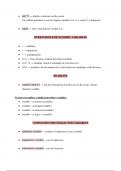Summary
Summary Introduction to Programming Course Commands Guide
- Course
- Institution
This document contains a guide on the R studio commands and what the command is used for to create and work with mathematical operations, readline variables, character variables, conditional statements, loops, functions, arrays and vectors, data frames, merges, and all of the dplyr commands.
[Show more]



